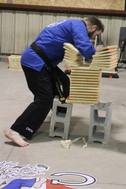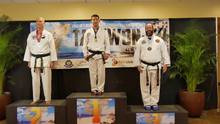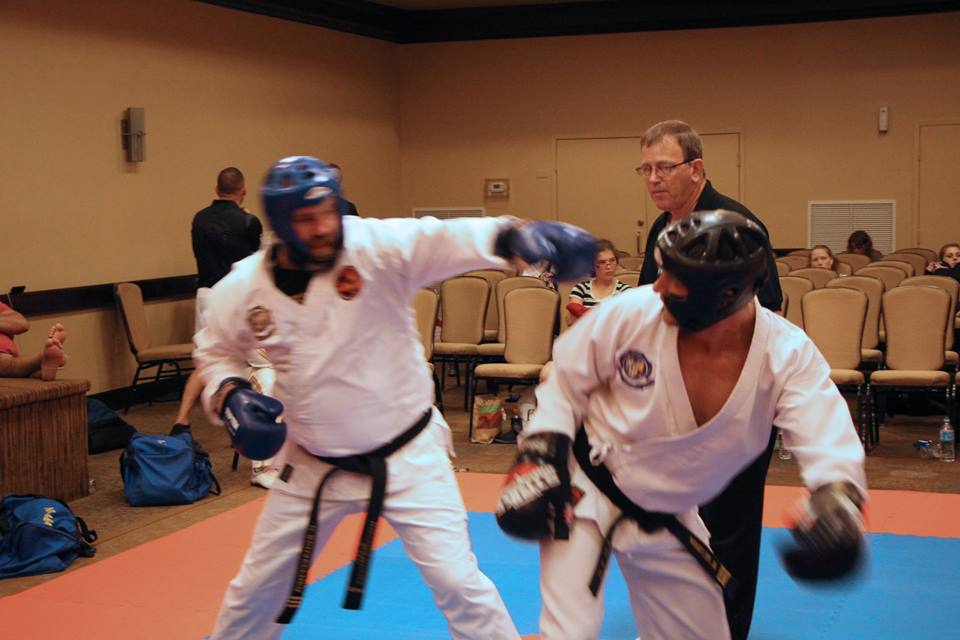“Live daringly, boldly, and fearlessly. Taste the relish to be found in competition – in having put forth the best within you.” - Henry J. Kaiser
Let's begin with a look at why people do and don't compete. First, many choose not to step in the ring, because of fear. What if they get hurt? What if they don't win? What if they make a huge mistake? There is probably as many excuses as there are potential competitors. Let's face it, fear causes many, even good martial artists, to stumble. Another huge obstacle is lack of preparation. We've all known someone who would compete, but there isn't enough time to get ready. Lastly, there are those students who are so good, they choose not to compete unless they have sufficient competition.
“The will to win, the desire to succeed, the urge to reach your full potential... These are the keys, that will unlock personal excellence - Confucius
But, are any of these excuses actually legitimate? In some ways, yes, but let's look at each of them again. Fear is a very real thing. Every day we face challenges and unknowns. Maybe we have a big test at school, or a meeting with a new client, at work. As martial artists, one of the great benefits is learning how to face fear and turn that energy into something positive. This goes along with competition too. Is there a chance we may get up in front of the judges and forget our form? Is there a chance we may lose that sparring match? Worst yet, what if we lose and end up in last place? These are all valid possibilities and someone always finishes last. But, someone also finishes first. I've seen many students afraid to compete, but then step out of the ring carrying a trophy or wearing a medal. One never knows what to expect until they arrive. Even the best competitors have bad days, and hard work really pays off.
“Fear is the the brain's way of telling us there is something important to overcome” - Rachel Huder
How about not being prepared? Is this a valid excuse? Is it possible to be a great martial artist, and not prepared to compete? Again, yes, it is possible, but another huge trait found in martial artists is their determination to always be prepared. There are no shortcuts in what we do, and the best way to be prepared is through constant and consistent practice. Regardless of whether we are preparing for our next testing, the next tournament, or some unknown self-defense situation, we should always be training and becoming better. This way, when the opportunity arises, we are ready to face the challenge, regardless of what form it takes.
“There are two types of people at belt testing, those who practiced and those who wish they practiced.” - Unknown
Lastly, let's look at those students who choose not to compete due to lack of challenge. I agree wholeheartedly that we don't learn, when we are always first. True learning occurs with defeat, but I ask what about the competitor? Are they learning anything by not competing against you? What is your lesson to them, they aren't worth your time? Again, that is not what martial arts is about. In saying this, I'm not saying that these decisions are made intentionally, but unfortunately, I hear it often enough to make an impression. Often ego is one of our worst enemies.
“Ego is just like a dust in the eye, without clearing the dust, you can't see anything. So clear the ego and see the world.” - Unknown
But let's change pace a little and look at some of the benefits of competition. Is it even worth the effort? Does it help forge a better student? Does it help to draw out the warrior spirit that is in all of us? For most of these questions, it is easy to answer, yes. Competition forces a student to step into the ring and apply their best efforts against someone else, and be judged accordingly. It is far different than a belt testing. At a testing, often everyone passes. In a tournament, only one ends with victory. But what if I lose? My answer is great! I would rather face some stiff competition and take last place, than to win an easy first. When one loses, they must re-evaluate their training. What is working? What needs changed? What mistakes did I make? How much effort do I need to put forth to do better next time? Often the answer is simple. Other times it requires a total overhaul of one's training program. Regardless of the changes, a student can walk away from the ring and know that what they learned will make them better.
“The ultimate victory in competition is delivered from the inner satisfaction of knowing that you have done your best and knowing that you have the most out of what you had to give” - Howard Cosell
So, a student has competed already, or they are preparing for their first tournament. What should they do to get ready for their next? First, a student should look at what events they will be doing. A student doing forms, for example, needs to practice the form they intend to use. They should break down each move, and work on stances, blocks, strikes, and kicks. They should train as often as possible and commit themselves to doing their ultimate best. If the event is sparring, one should work on footwork, combinations, blocking, and strategy. In my last several tournaments, I have found that I need to practice calming myself. I have been easily distracted and found I had difficulty focusing. To prepare for this in the future, I am working on calming and breathing exercises. Last summer, while competing at the world championships, I found that not only was I dealing with stress and anxiety, but in sparring, I found that regardless how strong and fast I began the matches, by the end, I was tired and out of breath. I have added a number of cardio drills to my workout, began running again daily, and will spend time doing many back to back practice rounds, prior to my next sparring tournament. Next time, I intend to be stronger, faster, and more aggressive.
“Don't train until you get it right, Train until you can't get it wrong” - Unknown
As illustrated above, there are numerous benefits to competition, it shows your strengths and weaknesses, it builds competitive drive, and the desire to succeed. It enables you to meet new friends, from other schools, and helps to develop potential life long bonds. It inspires you to push yourself harder and further, while training, and often fills the long, dry, gaps between belt testings. It teaches students to be good winners and more importantly good losers. It develops a sense of pride and accomplishment. In the end, it pushes each of us to be better martial artists and allows our inner warriors to shine. If anyone has a success story or advice, please feel free to write a comment and share your experience. Until next time, I'll see everyone, in the Dojang.



 RSS Feed
RSS Feed